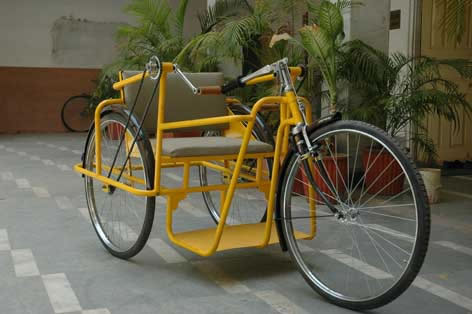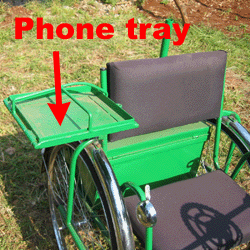1. Continuation of the powertrike project
For the past year we WDDC and M-Lab have been working on a design for a power-assisted tricycle with APDK. The previous prototype, which can be seen here, was more like a moped - it required pedaling to start the engine. APDK feels that pedal starting is too difficult for their clients and wants something closer to a motorcycle instead.
The team that develops this project will need to find a solution that will cost between $500 and $1000 for the entire product. The team should explore locally manufacturing the product and importing it from abroad. The product needs to be easily accessible (easy to transfer on and off), able to be started while stationary, and needs to be locally repairable. |
 |
2. Mobile post office for Indian handcycles
There is a desire in India to provide employment to people with disabilities by transforming their tricycle into a mobile post office. The tricycle user would travel around town delivering packages and letters, selling stamps, and picking up new mail. The aim of this project is to produce simple attachments for existing Indian tricycles to enable them to transport parcels and securely hold money and stamps. The attachments should be simple, low-cost, and locally-manufacturable. |
 |
3. Small business opportunities for wheelchair users
Two of the major problems that affect third-world people with disabilities are the inability to afford a mobility aid and the lack of available jobs. This project will address both issues by identifying small business opportunities that can be run from the back of a wheelchair and/or tricycle and producing attachments to support the businesses. With this plan, people with disabilities will purchase a mobility aid (possibly with micro-financing) and gain mobility as well as a source of income. The attachments produced should be locally-manufacturable and not significantly increase the cost of the wheelchair. Furthermore, they should be retrofittable to existing wheelchairs. |
 |
4. LFC continued development and production tooling
During the summer of 2010, a next-generation LFC will be produced and released for trial. This chair will require significant upgrades from the previous trial chair, including a ligher frame, reduced wheel width, lower seat, a higher seat back, seat belt, improved caster dynamics, and adjustable lever brakes. Additionally, production tooling needs to be designed to build the next generation LFCs. The team that develops this project will choose one or some elements of the LFC on which to work and participate in building the next generation chair. |
 |
|
|
